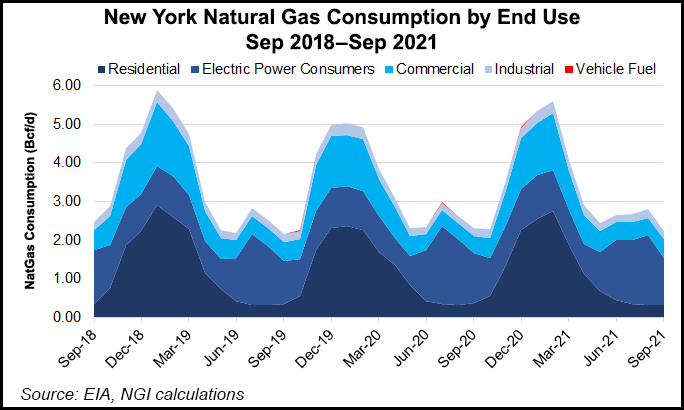Regulatory | Energy Transition | Infrastructure | NGI All News Access | NGI The Weekly Gas Market Report
New York City to Ban Natural Gas Hookups in New Buildings Beginning in Two Years
New York City has enacted a ban on natural gas hookups in new buildings starting at the end of 2027. For buildings up to six stories tall, the ban would take effect at the end of 2023.

The New York City council voted in favor of the bill on Wednesday. It now goes to Mayor Bill De Blasio, a staunch supporter of the plan, for his signature. Commercial kitchens, laundromats and emergency power options would be exempt from the ban.
America’s biggest city now joins dozens of smaller municipalities to announce similar bans on new gas hookups, many of which are on the West Coast. In August, the California Energy Commission (CEC) proposed limiting the use of natural gas in new and remodeled buildings beginning in 2023. At least 40 California cities already have adopted building codes with CEC approval that limit gas hookups in new construction.
Other cities across the United States are adopting net zero goals that could phase out natural gas use too. In a vote last month, the Ithaca, NY, city council approved decarbonizing buildings.
Earlier this year, de Blasio said New York City had to “renounce fossil fuels fully,” including banning fossil fuel connections in new construction, decarbonizing the city’s pension fund investments and transitioning away from fossil fuel cars.
A report from the Consumer Energy Alliance, whose membership includes hundreds of businesses and groups including BP plc, Enbridge Inc. and ExxonMobil, found that the ban could cost every New York City household at least $25,600.The Big Apple’s largest utility, Consolidated Edison Inc. (ConEd) distributes natural gas through 8,000 miles of pipes to 1.1 million customers throughout Manhattan, the Bronx, Queens and Westchester County.
© 2024 Natural Gas Intelligence. All rights reserved.
ISSN © 1532-1231 | ISSN © 2577-9877 | ISSN © 1532-1266 |


